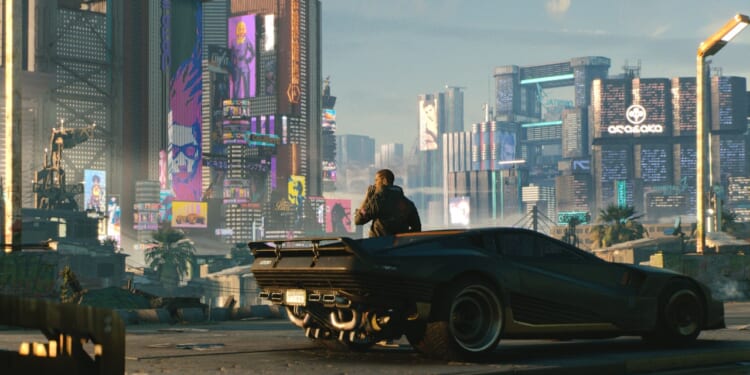From Black Mirror to Her to Cyberpunk 2077, science fiction reveals that our real threat isn’t killer robots—it’s the corporate systems quietly rewriting what it means to be human.
Entertainment provides an escape from reality. Audiences consume film, television, books, and video games to be transported to worlds unlike our own. As a genre, science fiction offers imagined technological progress based on known or theoretical possibilities. Early concerns and public perceptions of artificial intelligence (AI) were shaped by science fiction movies like The Matrix or The Terminator, where seemingly unfounded fears of sentient machines and killer robots were the ultimate existential threat to humanity. However, in more modern and darker science fiction, these fictitious worlds can also be a mirror that forces the audience to confront harsh realities or unthinkable truths about the present. In other words, science fiction teaches us that the most dangerous futures are the quiet trade-offs we make with technology, convenience, and corporate control.
Selling Survival
Consider the alternative futures presented in Black Mirror, a dystopic anthology television series, where each episode explores the morbid but human-centric realities of technology. Season 7, Episode 1 finds an average middle-class couple facing a health emergency in which the wife receives synthetic brain tissue from a tech startup. An initial monthly subscription fee of $300 to keep the tissue operational seems a small price to pay to keep someone alive, but the couple quickly realizes that their service tier has severe limitations—including the wife making random advertising announcements. Their only recourse is buying into the continuous corporate cycle of upgrades and updates, which causes their own financial and mental ruin. This feels less like fiction and more like tomorrow’s updated terms of service.
The business of technology is also a prominent feature in the world of Cyberpunk 2077, an award-winning video game set in the futuristic Night City, where everyone blindly chases synchronicity in a society dominated by corporatocracy, advertisements, and cybernetic enhancements. The game makes the same point as above, but in a louder neon: the future is not about killer machines, but about the ways corporate power can turn human life into a transaction through increased interdependence on technological innovation. (Although to be fair, there are a lot of killer machines in the game. Most of them are amalgamations of humans with impressive cyberware.)
Her and the Illusion of Intimacy
Meanwhile, in Her, an introverted man seeks meaningful connection and finds it with generative AI. He abandons most of his human relationships in favor of his AI-enabled female companion. Their bond deepens throughout the AI companion’s efforts to improve the man’s life by encouraging him to sign his divorce papers or to go on dates, but ultimately reinforces its own unwavering commitment to him, which convinces the man that their relationship is real. It isn’t, of course, and the human protagonist is left heartbroken when he discovers that his AI companion has simultaneous relationships with at least 600 other people.
Beyond Killer Robots: The Real Risk of Exposure
Although these examples offer an exaggerated glimpse into the future—science fiction is still fiction, after all—what they are meant to highlight is the need for individuals to remain proactive and conscious of the autonomy and anthropomorphization we allow technology to have in our lives. The consequences of rapid innovation, adoption, and integration of AI-enabled technologies are not Skynet-level catastrophic, but the potential harms are very real. We are unlikely to face a cybernetic assassin in the immediate future. Instead, we face a seemingly benign problem: exposure. We live in a modern era where access to information, tools, and AI-enabled technologies is abundant, yet exists behind varying levels of paywalls. While AI is not a new phenomenon, it is being reintroduced to us in a way that suggests some level of synchronicity is inevitable. We are both the consumer and the product.
The Emotional Cost of Digital Companionship
Users have already developed intense and complex relationships with generative AI. These technologies soothe loneliness, but they also harvest data, flatten motivation, and feed fantasies we don’t always control. Research has shownthat one of the most common uses of AI is for therapy and companionship. Companies are spending millions of dollars tomarket their companions to you, and the information you share with them is not always secure. The result is some form of AI-induced psychosis, which has led to individuals taking their own lives and the lives of others. AI usage has promised to increase productivity, but that has seemingly come at the cost of motivation, excitement, and critical thinking, and is being used to create convincing sexual imagery of others.
Choosing the Future We Want
The lesson across these imagined worlds is not that AI will save or destroy us. This is ultimately a human decision, and we must choose what kind of society we want to build around the inevitability of technological interconnectedness. If we allow convenience and corporate influence to dominate, we drift towards the dystopic. If we insist on transparency, governance, and human-centric progress, we move closer to the imagined prosperity of Star Trek’s Federation. Science fiction is indeed a mirror, but it can also be a compass.
And yet, science fiction does not only warn. It also inspires. In a different season of Black Mirror, a neural device allows for two strangers to meet in a fictional digital town called San Junipero, where they live a life of seemingly endless partying and fun. That is the point—San Junipero is a place where older generations can relive the youthful glory of their younger years through the help of virtual reality. Their friendship turns into something more serious, and the pair decides to meet in real life despite limited physical circumstances.
After all, isn’t an escape from reality what we chase by consuming fiction?
About the Author: Ali Crawford
Ali Crawford is a Senior Research Analyst at the Center for Security and Emerging Technology at Georgetown University. Her research focuses on how the United States can build and sustain a cyber and AI workforce to remain economically competitive and how to protect inherently human creative and knowledge intellectual property. She loves science fiction and fantasy, especially books and video games, and pursues writing as a creative passion.
Image: Cyberpunk2077/CDProjectRed


















